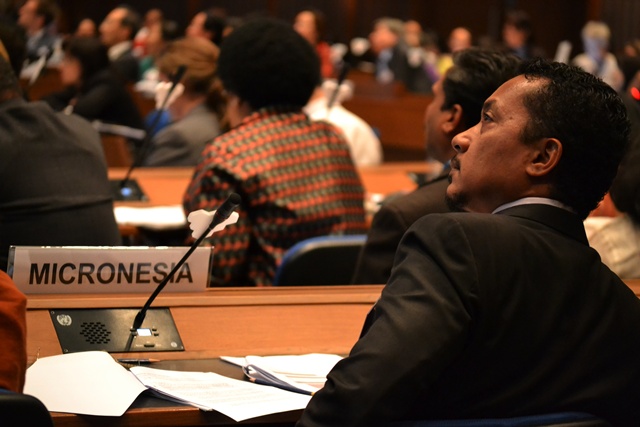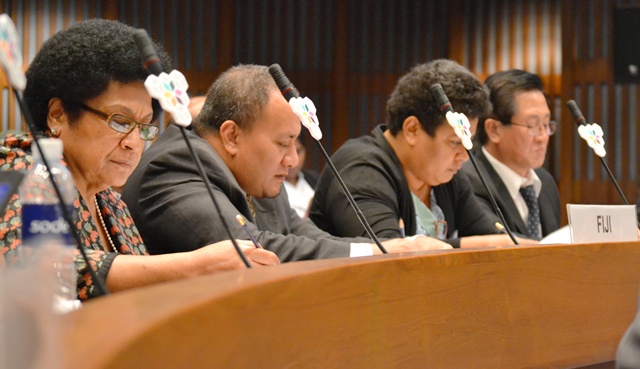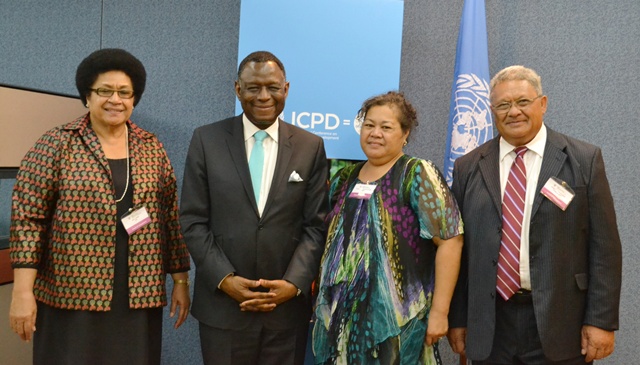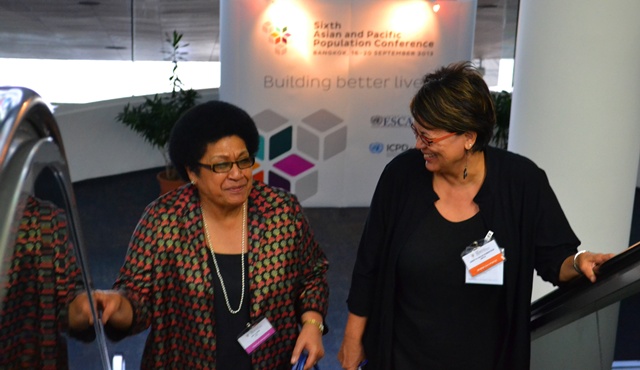On behalf of the Pacific Countries, namely Cook Islands, Fiji, Federated States of Micronesia, Kiribati, Nauru, Niue, Papua New Guinea, Samoa, Solomon Islands, Tonga, Tuvalu, Vanuatu, I have been asked to deliver a short statement related to ICPD priorities, as highlighted in the Pacific ICPD Review Report.
Twelve Pacific countries participated in the ICPD Global Review process and took note of significant progress, in many areas. However, much remains to be done.

Pacific Parliamentarians deliberated on August 13-15 2013 at the Pacific Conference of Parliamentarians for Advocacy on ICPD Beyond 2014 around progress, challenges and priority strategies towards achieving ICPD's Programme of Action. Pacific delegates endorse the Moana Declaration, which summarized the deliberations on progress with key actions to follow up on the ICPD PoA, we reaffirmed our commitments to reshaping ICPD beyond2014 and committed to further strengthening the promotion of a rights-based approach in advancing the ICPD agenda.
As Pacific delegates from these 12 sovereign nations, a sub-region which has some of the most vulnerable populations, we would like to endorse and expand on key elements of the Moana Declarations. These specifically pertain to ensuring sexual and reproductive health and rights for all our people, without discrimination on the basis of age, sex, gender identity or sexual orientation, economic status, religion, ethnicity.
We commit to addressing the cross cutting nature of population issues, vulnerability to climate change, globalization and environmental degradation.
We commit to increasing women's and young peoples' participation in decision making and in political, social and economic processes at all levels, particularly given that we have some of the lowest rates of women's participation in parliament.
We would like to see that there is increased support and protection for girls and young women, including enhancing access to education and comprehensive mechanisms for ensuring their access to sexual and reproductive information and services.

We support inclusive, sustainable development strategies and intend to respond to specific needs of persons with disabilities, vulnerable and marginalised groups.
We endorse the prioritization of couples' and individuals' access to contraception and information to make free and informed decisions about the number and timing of children, thereby preventing unwanted and unplanned pregnancies and reducing the need for abortion.
Results of recent studies on gender-based violence, reveal high levels of violence in all forms against women and girls. We recommend an integrated response to gender based violence in all sexual and reproductive health programmes and services.
Given that teenage pregnancy is an issue in many of our countries, we intend to prioritise adolescent and sexual reproductive health and rights, including through comprehensive sexuality education, and establish accessible SRH and mental health services for youth in schools and other educational institutions, youth organisations, faith based organisations and communities, ensuring their meaningful participation.

We commit to scaling up national efforts to halt the spread of STIs and HIV, and meet the goal of ensuring universal access to HIV education, prevention, treatment, care and support free of discrimination, including removing legal and policy barriers that impede access for key affected populations.
We recognize the heightened social and economic risk factors for NCDs confronting the peoples of the Pacific, and recommend key actions to strengthening prevention and control of these diseases that have significant impact on Pacific populations.
In addressing the unprecedented pace of population ageing in some Pacific nations, we commit to preparing for its social and economic implications for individuals, families, societies and the Pacific community.
We recognise that the issues surrounding internal and external migration, urbanization and urban growth in the Pacific is critical so that the growing number of urban residents, including the poor, have secure access to land, housing, water, sanitation, energy and transport, as well as health, education and other essential services; address the root causes of migration and poverty.
We commit to applying a human-rights based approach to the issues of internally displaced persons, refugees and asylum seekers in the Pacific.
Finally, we would like to contribute to reshaping the ICPD beyond 2014 and post 2015 development agenda at the regional and global levels and we will speak with a strong collective voice around these priority issues for the Pacific.
I thank you ladies and gentlemen.


